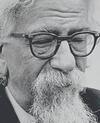weekly column
|
Each week, find a commentary on something connected to verses of Torah or another source of wisdom
|
|
Each week, find a commentary on something connected to verses of Torah or another source of wisdom
|
 Wisdom Wherever You Find It To the Prophets, a moral infraction was a cosmic outrage. Rabbi Abraham Joshua Heschel If you made a short list of modern thinkers who have inspired humanity, it would necessarily include Abraham Joshua Heschel. He lived his life at the intersections of existence – spiritual and practical, heaven and earth, human and divine, particular and universal, momentary and eternal. He was exquisitely exacting in expressing himself. His daughter Susanna remembers that he considered a successful day to be one on which he wrote a good sentence. This quotation must have made for a very good day. As with most of what he wrote, reading Heschel too quickly puts you in danger of missing the point. There is no incidental language in this sentence. An infraction is often a very minor transgression – in contemporary language it is used to describe illegal parking. A moral infraction sounds like a mere lapse in judgment, like not returning excess change from a small purchase or perhaps embarrassing someone with a casual remark. In fact, the person who commits an “infraction” may very well object to the notion that such a powerful word as “moral” is attached to it. But that is, I believe, Heschel’s point. The phrase “cosmic outrage” is loaded with power. If an infraction, moral or otherwise, is something one might excuse or overlook, there is no ignoring the explosive description of indignation writ large. Here is the intersection of the inconsequential and ultimate. And Heschel, who sought out those places of connection, invites you into the place where those concerns connect. Please don’t stop there because I do not want to overstate my case. This formidable assertion has a modifier. It appears in the introduction to the book that established Heschel as a voice of his generation, The Prophets. His examination of the Biblical prophets, individually and collectively, opened a window to the unique messages of each one and the ethos of prophecy. The prophets were not self-anointed orators. They were messengers, often reluctant, whose sensitivity to the divine presence provoked listeners then and down through the centuries to consider the way every person and every group of people (and especially the Jewish people) might live up to the sacred nature of being created in God’s image. That’s pretty old-fashioned language, but please remember that the Bible is an ancient collection. It is “to the Prophets” that the moral shortcoming was the source of divine anger. The prophets were our instructors, not necessarily our role models. To live at the intersection of human fallacy and divine rectitude, a person needs to know both. The first qualification is widely accessible. The latter is in scarce supply, and not something that any person can merely claim. Heschel and other believers in the Bible attribute the knowledge of God’s will to God’s will, not to human deduction. Prophetic teaching, which is not predictive (the modern sense of the word) rather instructive, is meant to make us sensitive to what Heschel called the “divine pathos.” The general lesson that Heschel describes is that our misconduct breaks God’s heart. Reading the Prophets with that notion in mind (in fact, reading all of the Bible with that in mind) casts the God of the Hebrew Bible in a much more sympathetic light than ancient and modern skeptics accusingly shine on the “Old Testament.” (An aside: “old” sounds much less pejorative to me now that I am old.) But here is the other lesson of Heschel’s teaching. Modern activists who lay claim to the insight of the Prophets almost always overstep their bounds. Those who confuse personal outrage with cosmic outrage commit their own moral infraction. Actions that purposely cause suffering to others, justified by the would-be prophets, cause divine heartbreak, not approbation. If Heschel could take great satisfaction in one carefully crafted sentence, we, his students, should be at least that deliberate in applying his lessons.
0 Comments
Leave a Reply. |
Archives
October 2023
Categories |